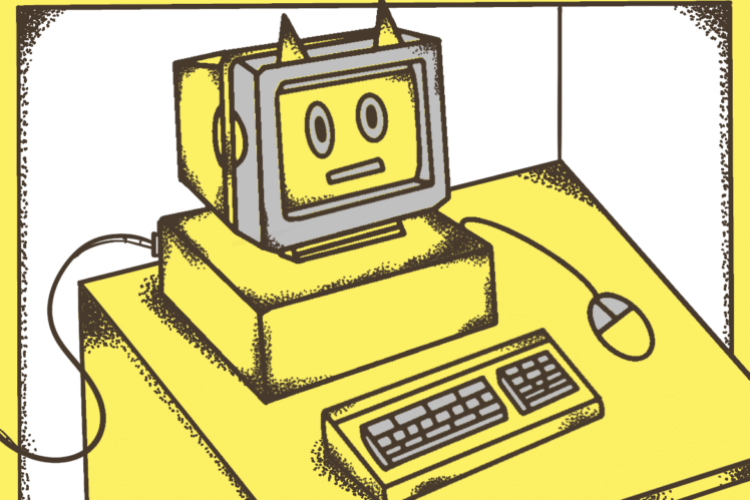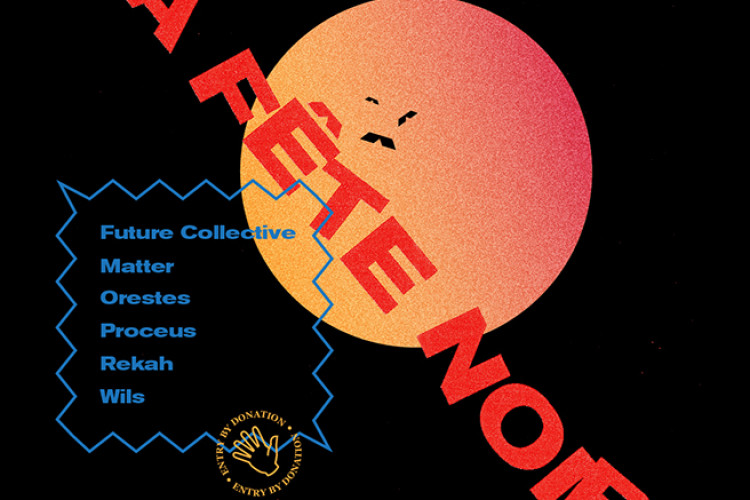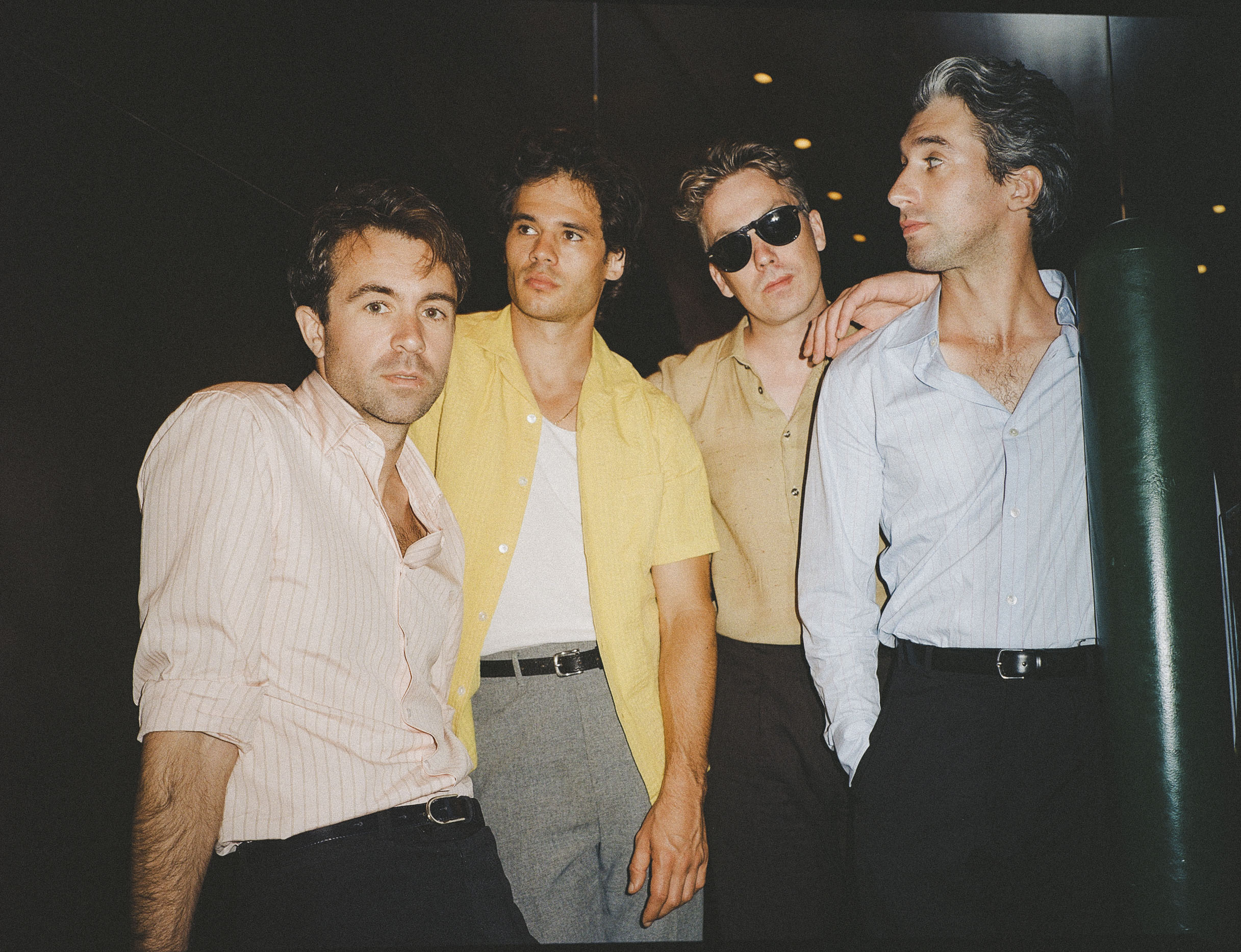
Justin Young: “I still hear people tell me that the way they discovered The Vaccines was on the FIFA soundtrack.”
As we’re approaching The Vaccines’ first live performance in Bali, we had a chat with their frontman, Justin Young, and went over the band’s growth over the years, their efforts on bringing relief for the London housing crisis, and FIFA video games.
Words by Whiteboard Journal
Words: Garrin Faturrahman & Paula Nanlohy
Photo: The Vaccines
Coming across new music has always been at the tip of our fingers, as various mediums like video games to TV commercials are really a gateway to another point of discovery (and self-discovery, at that). The Vaccines were one that saw how ubiquity is a major force in propelling them towards the masses, especially since the infancy of Tumblr music and in your youths: From scouring countless blogs for a reblog, discovering new tunes from video games that then shaped your personality, up until the day you found a little self-respect in yourself, The Vaccines might just be the song playing in the background.
And calling out said earlier days is not without a cause, as The Vaccines too grew with us—seeing how “If You Wanna” also matured into “Heartbreak Kid” in their latest album, Pick-Up Full of Pink Carnations (2024). But despite their sequence that shows how they come of age (pun intended), Justin Young noted here that his reasons and feelings for songwriting did not change from the band’s earlier days.
And here we were blessed with the opportunity to have a chat with The Vaccines’ frontman himself, days before their maiden gig in Bali, Indonesia as prepped by Collective Minds for next week.
Paula: Can I just say that your music was the soundtrack of my high school and college days?
Oh, that’s awesome! Thank you very much.
Garrin: Alright. How about we start with something light?
Great! Let’s do it.
Garrin: I read that you are a fan of Manchester United, yes?
This is true, yeah.
Garrin: Okay. Speaking of the blokecore trend, do you wear football jerseys for your gigs or on the dailies?
Do you know what? I always love it when someone brings a local football jersey to a gig, and sometimes the promoter or a fan will give them as gifts—like they quite often do in Mexico—and at least one of us will wear it on stage then. I always think that’s like a nice thing.
But I have so many football shirts and I never wear any of them. I sort of have an amazing collection of football shirts, [but] they never look very good on me. I mean, I wear them when I’m playing football, obviously (which isn’t very much anymore). But yeah, I think there’s something when I was a kid, like, all I wanted was a full Manchester United kit. So there’s still like “the little boy” in me that whenever someone gives me a football shirt, I get very excited.
Garrin: So what would be your personal favorite jersey?
Well, I, to be honest, just because it was sort of a big thing for me as a Manchester United fan when I was… I guess I was like eight or nine? The 1994–95 home kit for Manchester United. I love that kit.
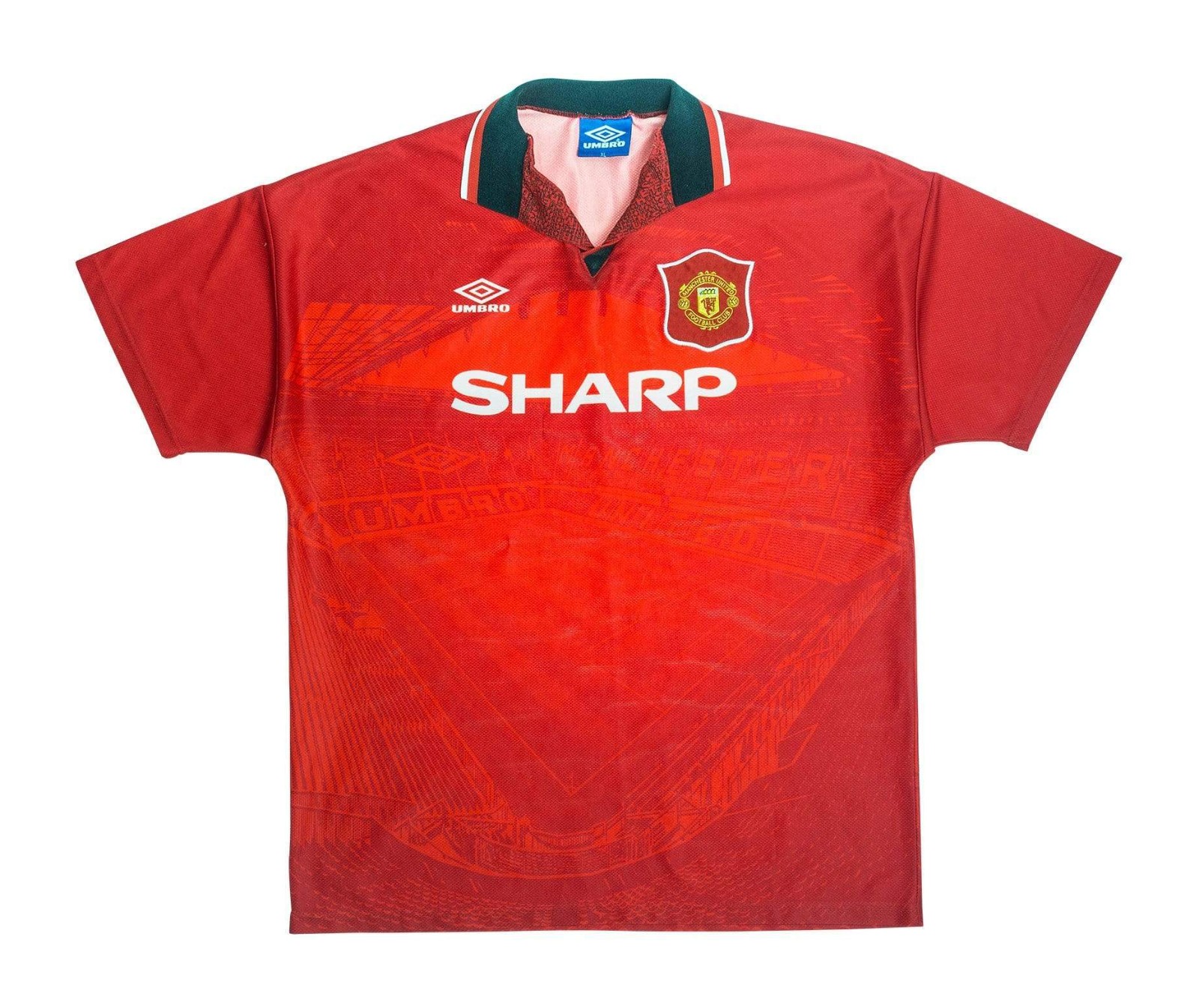
The 1994–95 home kit for Manchester United in question. (Source: Football Kit Archive)
Paula: I want to ask about your part in pop culture. Your song “I Always Knew” was featured in one of the episodes in New Girl. Can you name us some of your favorite TV shows?
I love Succession…
Paula: Cool! Who’s your favorite character?
I know you’re not really supposed to like any of them, but I do quite like Kendall. Cousin Greg, obviously.
But growing up, I think that a lot of my music taste was informed by TV shows. I was a big fan of The O.C. because I was like 15 when that show came out and that, like, you know, I think helped change an entire generation’s sort of taste in music, and you could probably say the same about Euphoria now and that these kind of big cultural touchstones where the soundtrack is almost as important as the storylines and stuff.
So, whenever our music has been on something like New Girl or whatever. I’ve always, that’s always really excited me because I know that for a lot of people that’s where they discover music and stuff. But yeah, I like Succession. What else have I been watching recently that I loved… I mean, I watch a lot of TV. I’m a big Game of Thrones fan.
Paula: Do you watch the UK version of Shameless?
No. I’ve never seen it, but I know it’s very good. I’ve watched clips of it, but yeah.
Paula: Since the pandemic, your band’s name has become kind of challenging to look up on social media and search engines. How do you navigate promoting your music in such circumstances and does the situation frustrate you in any way?
Yeah, it really frustrates me. I don’t think we expected it to be so difficult when the pandemic first started. And even now, you know, I tried to search The Vaccines on Instagram yesterday, and we didn’t come up. And if you put it in Spotify, it won’t come up. And everything we post still comes with a warning. So it’s really frustrating.
And I remember when it first started happening, our label kind of made contact with all the social media companies and stuff. But obviously, they had more important things to worry about than changing their algorithm just for us. So it’s been really hard and, you know, we chose our band name because we didn’t really think it really meant anything. We thought it was a sort of empty vessel of a name. So it’s been quite frustrating. But what can you do?
Paula: Can you elaborate on how you navigate to promote your music during this time?
Well, we just do what we’ve always done and just hope it gets through to people. I mean, there’s nothing you really can do, yeah?
Garrin: Let’s look back for a while. I read that you were in a powerviolence band and as a nu-folk solo as well?
Yes. I was in lots of bands, you know. I think when you’re a teenager and you first discover music, and you discover writing music and playing music and expressing yourself, I think you’re just looking for as many ways to do that as much as you can, and finding your feet, finding your voice, your artistry, and stuff. Yeah, I’ve had lots of different projects along the way.
Garrin: So what was “that voice” that you found during your exploration period?
Yeah, I mean, I think the voice I have now, which is like, is your own. It’s kind of like this honest, sort of raw, sort of naked, self-expression where you’re not really doing impressions of anyone else.
You’re just kind of being you, and I think that takes a little while to figure all that out.
Paula: In your early twenties, you lived with three other musicians—one of which was the former frontman of Mumford & Sons. Do you have any fond memories you wish to share with us, maybe any songwriting-together moments?
Well, there was lots of songwritings. I mean, we were all sort of 20–21 living in this house and all tried to make it as musicians and not really doing anything other than playing music. And it was a really exciting, fun time. And there were lots of other musicians coming through the house, and I think everybody was very supportive of each other. We played in each other’s bands, and we played gigs together, we went on tour together. It was just a time of expressions and discovery. It was a fun time.
Paula: Would you say the lifestyle of musicians living together under one roof is as rock and roll as people imagined it to be?
I mean, not always. Hahaha.
Garrin: I saw that your guitars are either offset or hollow-bodied. Does your preference in guitar models have any resonance with your personality that you wish to bring out through The Vaccines?
Well, you know, I like the kind of cheap catalog guitars that kind of look amazing and tell an interesting story. I’m not a sort of, you know, if you were to ask, any others would be more concerned with the quality of sound and that sort of thing. Whereas I am… I love, like, design. I love the way things look and I love… there’s a sort of escapism, really, that comes with certain… I guess, what’s the word I’m looking for… Like visuals in music, I don’t know, I don’t really care too much about how things sound, I just kinda like the way they look. So I’m always looking for weird and wonderful guitars to take on tour with me.
Garrin: The Danelectro guitar, was it?
That was on the first album. Yeah, exactly.
Garrin: What do you mean by “the escapism” and “visual aesthetics”, by the way?
Yeah, just how everything sort of looks otherworldly. 50s and 60s thing where guitars look like cars and spaceships, that sort of stuff.

Justin's Danelectro Dead-on '67. (Source: God's Own Guitars)

Justin's Danelectro Dead-on '67. (Source: God's Own Guitars)

Justin's Danelectro Dead-on '67. (Source: God's Own Guitars)
Paula: I actually haven’t seen you live, but I watched your live performances on YouTube and I think your stage presence is in a way very whimsical. Are there any particular musicians who inspired your stage persona?
Not consciously, I think everything you do is, to a degree, borrowed from someone else. It’s quite hard to be completely original in rock music or pop music. And I think you sort of grow up watching and listening to, sort of feeds your idea of what you’re supposed to be doing on stage. And everyone you toured with, everyone you played with, I think maybe… It’s a bit like, you know, changing the way you speak if you go to a certain school or something. I think, it’s like, it all kind of informs the performance. Even if you don’t realize it’s happening.
Paula: So it’s a mix of many musicians. But is there any specific “vibe” you want to bring out to the audience wherever you go on your live performances?
We just want people to have fun, you know? I think we have fun, and we give everything we have, and we know that it takes a lot of effort and a lot of money and stuff for people to come to our gigs. And so, we wanna entertain them as much as we can. And we want to give them every last drop of blood, sweat, and tears. I think we give 100% every time we play. And, yeah, we want people to feel something when they’re there. And maybe that’s not fun, maybe that’s another emotion, but we don’t want people to leave feeling like we didn’t give it our all.
Paula: Let’s travel back in time to your first album, What Did You Expect From The Vaccines?, the album that introduced me to your music, actually. And to me personally, it is an album that showcases the chaotic essence of youth: from heartbreaks in “If You Wanna” or “Post Break-up Sex”, the daunting feeling of growing up like in “Wetsuit”, to an unadulterated highlight of angstiness. Looking back at it now, do you have any advice to the young Justin Young on how to tackle adulthood?
I think, just not to worry too much. I think you spent a lot of time worrying about things that are gonna go wrong. And things inevitably do go wrong, but never the things you worry will go wrong, and never in the way as you expect one to. Life is hard, and it’s confusing, and complicated, and all those things at that.
I think if you’re a good person, with a bit of luck, there’d be people around you that love you, and care about you, and will help you navigate it.
You know, I’ve had some bad times and I’ve had some good times, but it’s never been as I feared it would be, so, haha.
Paula: I’m actually now the same age as you were when you made this album, so I will take that advice very seriously!
Yeah, don’t worry!
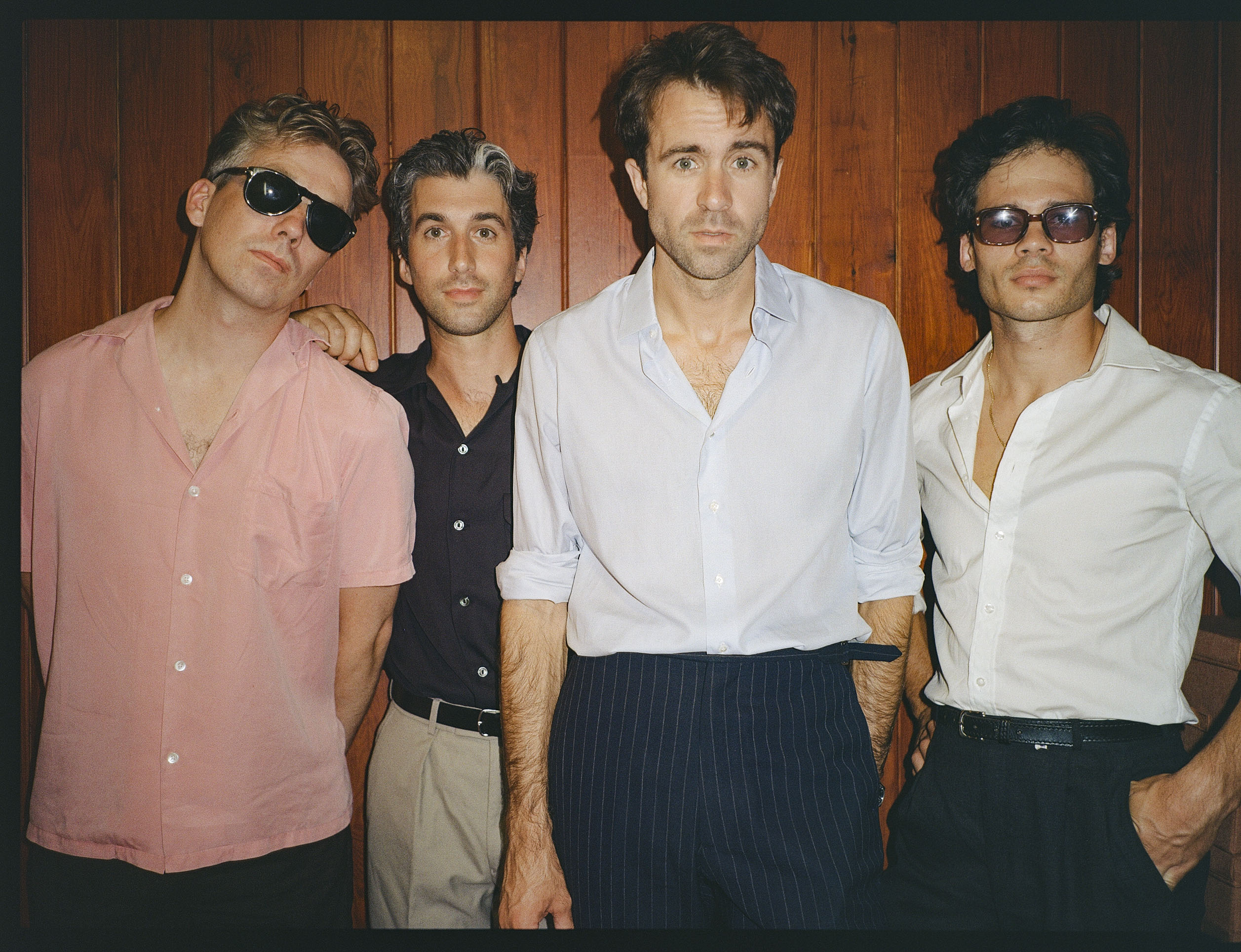
(Photo: The Vaccines)
Garrin: Anyway, The Vaccines, during the first album, can be seen to have emerged during the, as we call it today, “indie sleaze” era. Has anything changed in your approach to writing songs, from back then to today?
I think your method changes, because you’re constantly looking for new ways to inspire yourself. And your environment changes, perhaps your collaborators change and all that sort of stuff. But I think why you write songs, and the feeling you get when you write them and the feeling you get when you’re chasing them, I think that always stays the same, or it’s always stayed the same for me. And the reason I write remains the same, I suppose.
Yeah, I think the reason I write a song now is the same reason I wrote a song 15 years ago. But I think methodology is always changing. When I wrote the first album, I could have a laptop, but I certainly didn’t have, like, a voice memo on my phone. I was doing things by memory and stuff. Whereas now, I don’t think you need to.
Method changes, but where it comes from and where you want it to end up, I think stays the same.
Paula: Still on that topic, in an interview with NME, you said that Back in Love City is potentially a concept album. Any particular aesthetic in mind when you create the Love City realm?
I think we tried to sort of… (it was so long ago now). But I think we tried to kind of, it was a sort of, whether it was utopian or dystopian, I don’t know. But there’s sort of neon skylines, somewhere between Tokyo and, I don’t know, Mexico City or something. Some sort of retro-future. Yeah, I don’t know. Sort of Vegas, Sin City, yeah.
Paula: Is it like, Black Mirror, but make it neon?
Yeah.
Garrin: Your band was featured as one of the songs for the FIFA video game series, namely FIFA 12. I consider those era of FIFA soundtracks as the definitive era of exploring indie rock bands. Were your band helped in any way from being a part of FIFA soundtrack?
I don’t know. I think, you know, when you’re a new act—or any act—I think ubiquity helps: I think being on New Girl, being on FIFA, being on a billboard here, being on a radio there, I think all that sort of stuff helps. I still hear people tell me that the way they discovered The Vaccines was on the FIFA soundtrack. So, I think it must have helped. Definitely.
Garrin: What about today, Justin? What do you think about the exposure of new bands to people?
I think it’s harder and harder to get discovered. Things are less and less centralized, even something like games—there’s a lot more people playing games, but there’s a lot more games to play. And I think it’s harder than ever to be discovered.
But again, I think if you have that ubiquity and on the biggest game in the moment, and you’re on the biggest radio station, and you’re on the biggest TV show, I think it also continues, I suppose, to be the same in that respect.
Garrin: Regarding the UK indie rock scene, with regards to the recent breakthrough of bands like Black Country, New Road, Squid, to Ugly (UK), how is the UK indie rock scene doing now compared to those early 2010s days?
That’s a good question, really. I mean, The Vaccines, I never really felt like we are part of a scene. I still don’t. And, you know, I guess you mentioned all those bands, they definitely came out of that kind of Brixton, Windmill, sort of South London. I guess a lot of them went to the same music colleges and stuff as well, didn’t they?
I don’t know, I mean, I don’t really know how to answer that. I think London is a huge city with a wealth of, sort of creative sort of talent. And it continues to draw creatives from all over the world. So I think that it will always have a scene and then it will always have, I suppose, a comparatively healthy scene, you would like to think. There’s still the drawer of London for creatives, you know. Yeah, I think I don’t really know how to answer that question.
Garrin: Your set in Bali will be your first to perform in Indonesia. Have you heard of anything regarding our music scene?
Not really, no. And it’s always, you know, I DJ-ed in Jakarta once, and I came to Yogyakarta. But this is our first time as The Vaccines doing anything there. And we don’t really know what to expect, but we’re really excited.
Garrin: What Did You Expect From Indonesia?
We’ll find out.
Paula: We noticed that you put a PayPal link to support Streets of London on your Spotify profile. Is there any specific reason why you feel this issue is important for many people to know about?
Well, I’ve been a patron of Streets of London for ten years or so, and there’s a really big homelessness crisis—I mean not just in London, well, across the world. But I think in a city as wealthy as London where you have sort of unimaginable wealth, I think the fact that we have so many people sleeping rough without a roof over their head feels very… feels wrong. And it feels archaic and it feels like it should be from another time. But it’s not. And it feels in some ways that it continues to get worse and worse. So, I mean, it’s just basic human decency, isn’t it? To want people to be able to sleep with a roof over somewhere safe and warm.
Paula: Can you paint us a picture of the extent of the housing crisis in London?
Well, I don’t have numbers or anything like that. No. But it’s pretty bad. I mean, you know, if I was to walk out my front door now, you know, I’d only have to walk 5 minutes to see two or three homeless people. Yeah, it’s everywhere, really.
Garrin: Okay, we’re gonna go to the final question. Still in regards to the exposure of bands through other media like TV shows, video games. How do you feel about the practice of extracting parts of a song to advertise a product?
I think if an artist doesn’t morally object to the product—you know an artist always has a choice there—if it’s something that they can sort of, I suppose, morally get behind, then it’s yet another way for a song and an artist to be discovered. I mean, we had a song that they used in a beer commercial in Spain, and as a result, we had like a top 5 hit there because it was in this commercial. And you know, it made us a much bigger band in Spain. And it’s very hard for bands to find ways to sort of grow their audiences. So that was like an amazing opportunity for us and we all like beer. So that wasn’t like, you know, that wasn’t too difficult of a decision.
Guess that will be all.
Thank you! All right, guys. It was nice to speak to you.
Thank you very much. Enjoy your trip to Bali!
Thanks a lot, thank you.
View this post on Instagram
—
Watch The Vaccines live in Black Sand Brewery, Bali, on May 16 2024. Grab your tickets via Collective Minds’ official website here.









